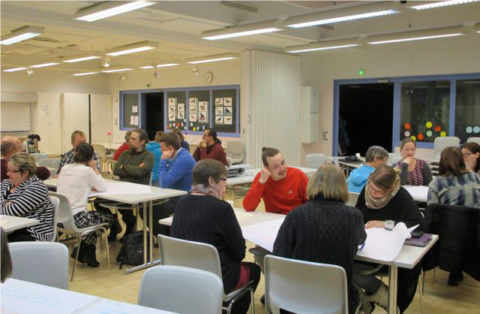Take care of the parents, too
Before our new national core curriculum was put into practice, it took two years from municipalities and schools to get familiar with it, plan and get ready. One part of the work was to share the ideas of the new curriculum with parents and have their ideas as well. Our core curriculum is being given as a framework and it leaves room for local decision makers and requires a lot of work and discussion between different stakeholders.
I had a pleasure to be there and help parents to discuss and give their views on future school life. We had many fruitful and active workshops that gave parents good possibility to participate and influence on their children´s school life. Our newspapers and media were also there to inform and share experts views on new core curriculum and how it is going to change the school life and learning.
In many Asian countries, the competition is part of studying and learning. Even if schools and teachers understand that competition and competitive atmosphere do not support learning, parents might push their children to compete and demand teachers to support that model, too. Parents need updated, research based knowledge about learning and modern ideas of school work. That is also schools´ duty. Ways and methods should be thought carefully.
Next 8 points are written by class teacher Reena Linna. The headline is “How to support your child with schoolwork.” Original text in Finnish can be found here.
Translation is by me.
- Be interested
Ask about the school day and encourage child to tell about his/her school day and about the happenings at school. Ask every now and then to see his/her books and worksheets and the tasks that have been done at school. Take care that homework time or exam reading time is pleasant. Do listen his/her homework patiently even you would have a lot of other things to do. If you feel that homework take too much time or are too challenging, contact the teacher. Child needs time to recover from school, time for play and rest.
- Praise and encourage
At school pupils are praised and encouraged, but that is needed at home as well. Support his/her strengths and strengths can be also something else than needed at school and with studies. That has positive effect on his/her self-confidence.
- Talk positively about the school
Parents´ and siblings´ attitude towards the school and learning reflects and sticks, so be careful, how and what do you speak to your child about your own school experiences. Consider that every child is unique and some of the children need more support with school and homework. The most important thing is that the child likes to go to school. Learning at school is in the focus and attitude has big influence on learning. - Do not compare your child with others
Every pupil is unique person. His/her development should be compared only with his/her earlier skills. Comparison with siblings, relatives or schoolmates causes easily jealousy, bad feeling and undermines his/her self-esteem.
- Encourage child to be boldly him/herself
Remind your child that he/she is unique and loved as he/she is. Encourage him/her to be also at school as he/she is. Encourage him/her to be active, to participate and share his/her ideas and of course to listen the others. Encourage him/her to be curious and wonder things. Remind him/her that all the questions are good and one learns and develops through questions.
- Foster good manners
Good manners are part of the goals of the school work and assessment. Your child´s school path is easier, if good manners are used and valued also at home. When the rules and manners of the school and home are near to each other’s, we avoid the everyday cultural shock. Child feels safer, when all the adults foster same good manners. The most important thing in the functionality of the community is respectful presence. Remind that bullying is always wrong and it needs to be taken seriously!
- Give child responsibility
At school child will learn to take gradually responsibility of his/her own learning and school work, so give him/her some small responsibilities, that fit to his/her age level, also at home. Guide child to take independently care of his/her school supplies and homework. Remind her about things, but do not take the responsibility.
- Discuss and be supportive
Everyone makes mistakes sometimes and sometimes there are news from school, that are not good. Nevertheless, in all situations, offer support and safety. Do not defend him/her, if he/she has done something wrong, but discuss about the situation and guide to avoid same mistakes in the future. Foster honesty. Be in touch with the teacher if you have any questions. Collaboration is a key and as educators you should always try to be “on the same side” with the school so that the child does not get conflicting messages.
I wish a very good and inspiring beginning of the school year to everyone!
-Elina


